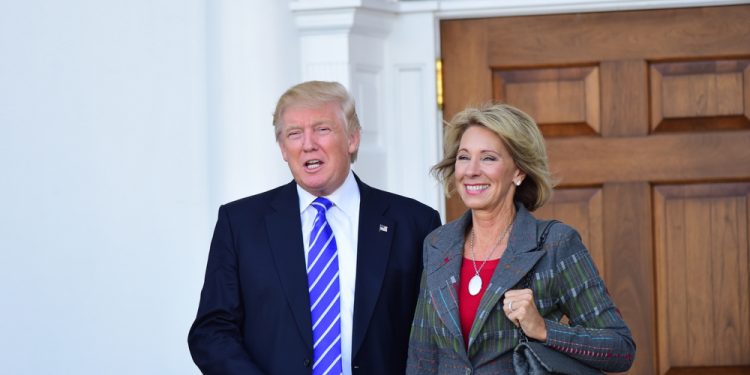
The people that know Betsy DeVos’ education record the best are already highlighting all that her reforms were able to accomplish in Detroit
December 10, 2016

The people that know Betsy DeVos’ education record the best are already highlighting all that her reforms were able to accomplish in Detroit
December 10, 2016
The Wall Street Journal
Ingrid Jacques
December 10, 2016
To the dismay of teachers unions nationwide, President-elect Donald Trump has picked Betsy DeVos, a Michigan school reformer, to be the next education secretary. The day Ms. DeVos’s selection was announced, the president of the American Federation of Teachers, Randi Weingarten, called her “the most ideological, anti-public-education nominee put forward since President Carter created a Cabinet-level Department of Education.” But as it often goes, what is bad for the teachers unions is good for the school kids. Ms. DeVos has a strong record of fighting for the latter here in her home state.
Her history of promoting charter schools goes back to 1994, when she worked closely with former Republican Gov. John Engler to pass Michigan’s charter law. These alternative public schools, free from union constraints, have flourished—especially in Detroit, where more than half of students attend charters. Only New Orleans has a higher percentage of students in charter schools.
But time and again, Michigan has resisted comprehensive reform. In 2000, Ms. DeVos and her husband funded a ballot initiative that would have created vouchers for students to use state funding at private schools. But the measure was defeated 69-31.
In 2003, a retired industrialist named Bob Thompson tried to give Detroit $200 million to establish a network of high-quality charter schools. His generous offer was originally accepted by then-Mayor Kwame Kilpatrick and Gov. Jennifer Granholm. But the Detroit teachers union protested and the politicians withdrew their support. In frustration, Mr. Thompson also changed his mind.
But despite facing backlash, Ms. DeVos hasn’t given up. In 2011 a Republican-controlled legislature voted to lift the cap on the number of charters, which had been set at 150 university-authorized schools. This has helped them flourish further.
Michigan allows the schools to be chartered by a variety of institutions, including public universities, which run most of the schools, instead of making school districts the sole authorizer. Mr. Engler, with help from Ms. DeVos, designed the law this way to foster competition.
Since the mid-1990s, a dozen authorizers have opened nearly 100 charter schools in Detroit. Critics pretend this has led to a Wild West environment, where anything goes. There is indeed a need for more communication among authorizers regarding school location. But only seven new charters opened in Michigan last year. In Detroit there has been a net gain of only three charter schools over the past seven years. That’s hardly out-of-control expansion.
Michigan’s charter model has also been criticized for its purported lack of accountability. Critics claim that schools aren’t held to high standards. But more than 100 charters have been closed in the last 20 years, both for academic and financial reasons. Not a single traditional public school in the state has ever closed because of poor performance.
These arguments came to the fore early this year when legislation tied to a bailout of Detroit Public Schools was put forward that would have limited charter-school growth through the formation of a city education commission. The point of the commission was to boost enrollment at Detroit Public Schools, which is down by 100,000 in the past decade. The district was on the verge of bankruptcy.
The Great Lakes Education Project, the school-reform group funded by the DeVoses, fought hard against the unnecessary layer of bureaucracy. They prevailed, and lawmakers ultimately agreed in June on a $617 million bailout of the Detroit district, as well as some stronger accountability measures for all schools. For instance, persistently failing schools—including both traditional ones and charters—will be closed after three years of probation. About 30 schools fit that category, and dealing with the worst offenders would allow better schools to thrive.
There’s still work to be done. Detroit Public Schools have consistently scored dead last among America’s urban districts on the National Assessment of Educational Progress.
The city’s charters are doing better. In 2013, Stanford University’s Center for Research on Education Outcomes found that Detroit charter students gain three months of extra learning a year compared with their peers in traditional schools. A 2015 study showed similar results. Detroit, it said, was one of four districts nationwide to “provide essential examples of school-level and system-level commitments to quality that can serve as models to other communities.” That’s despite the city’s having one of the highest-poverty urban charter populations.
Michigan still has in place an extremely restrictive anti-voucher constitutional amendment. When the 2000 ballot initiative flopped, it was Detroit youth who suffered. Vouchers also could have saved the city’s parochial schools, which for generations helped educate many of the poorest children. In 1985, there were 54 Catholic schools. Today, only eight remain.
Frustrated with the roadblocks in her home state, Ms. DeVos turned to promoting school choice nationally. Now half of states allow private-school options in some form. That includes Michigan’s neighbors in the Midwest—Indiana, Wisconsin and Ohio—which boast both more choice and higher test scores.
Charter schools in Detroit have given parents at least one viable alternative to failing public schools. That’s thanks in large part to Betsy DeVos. Now, with the coming official title of education secretary, she has the opportunity to give parents all across the country the same kind of say in their children’s education.
Ms. Jacques is the deputy editorial-page editor at the Detroit News.